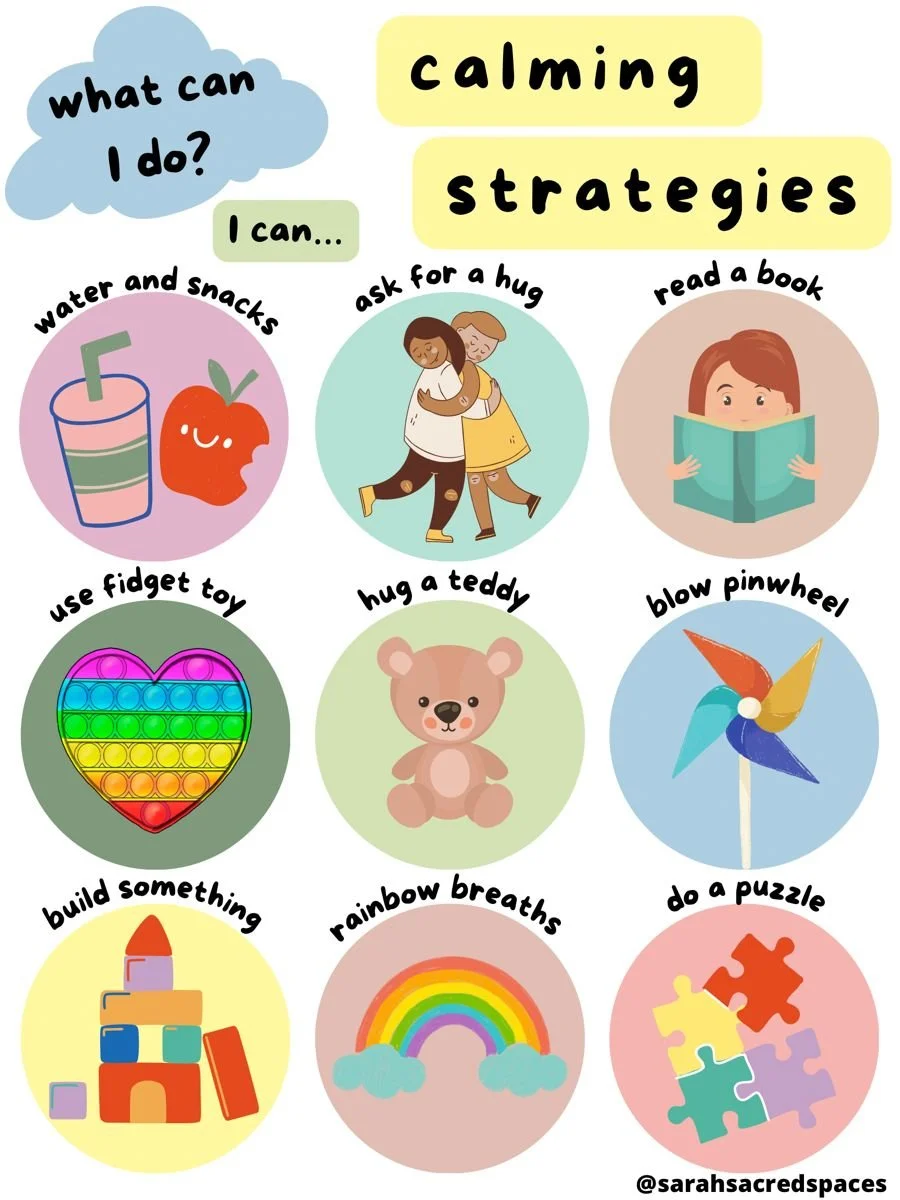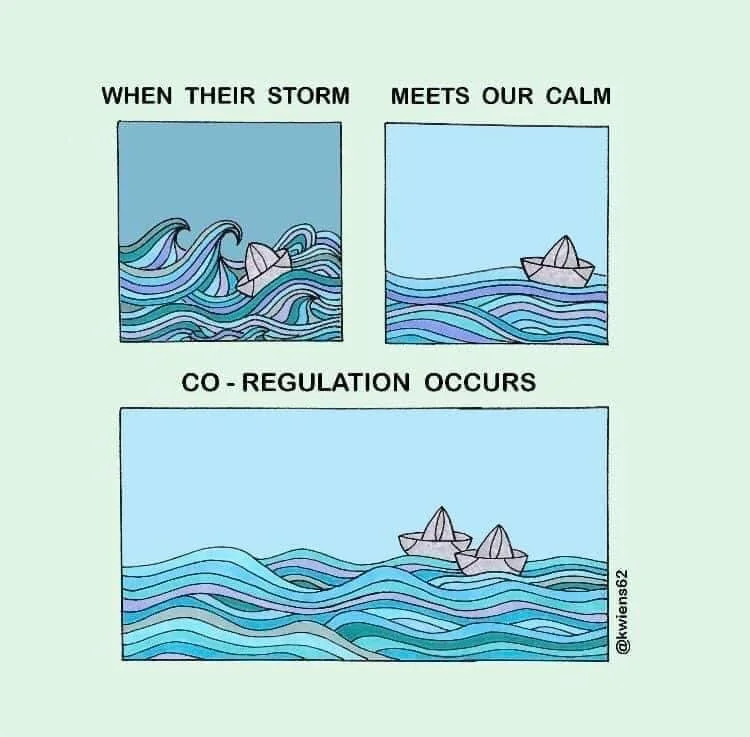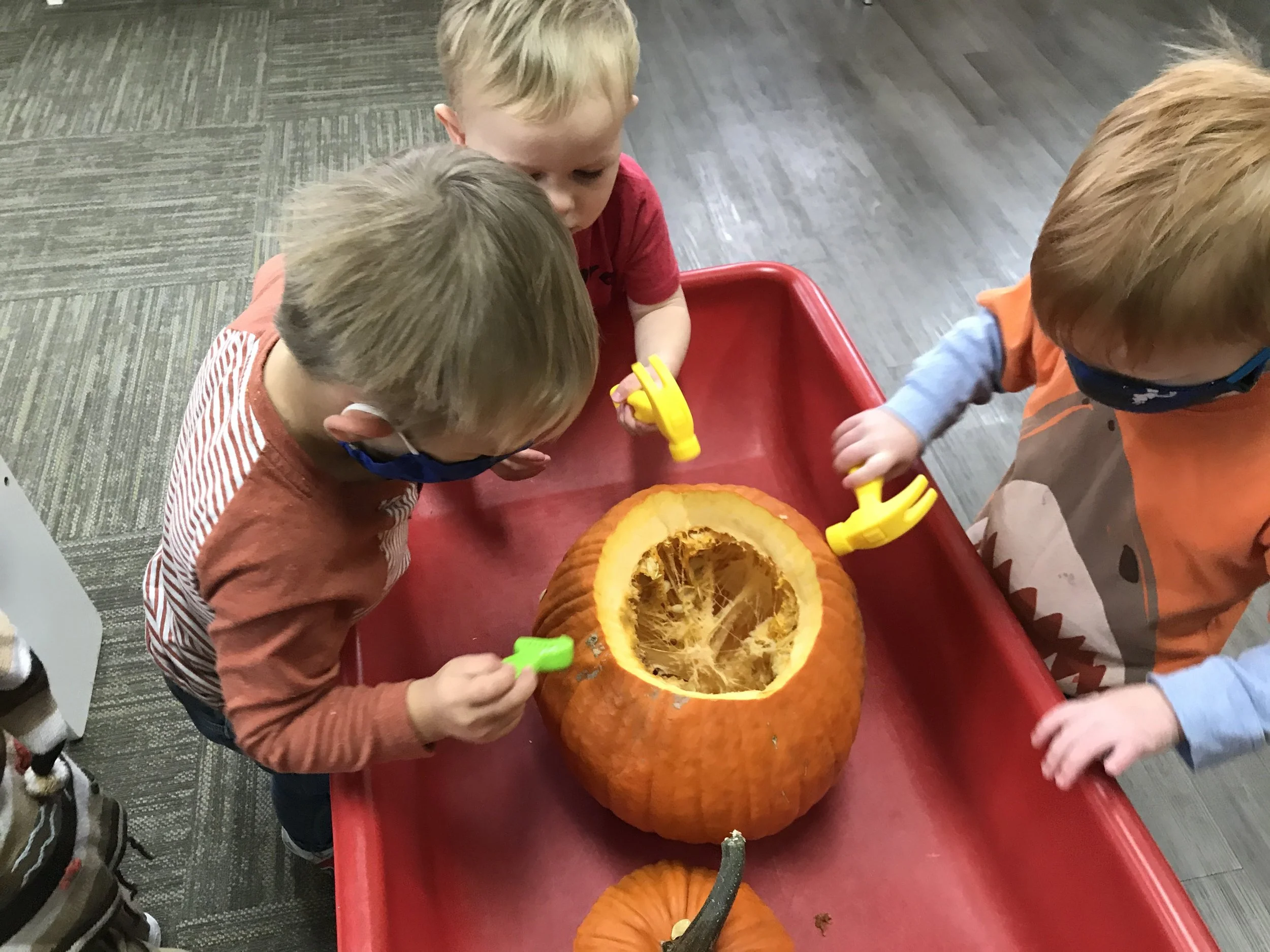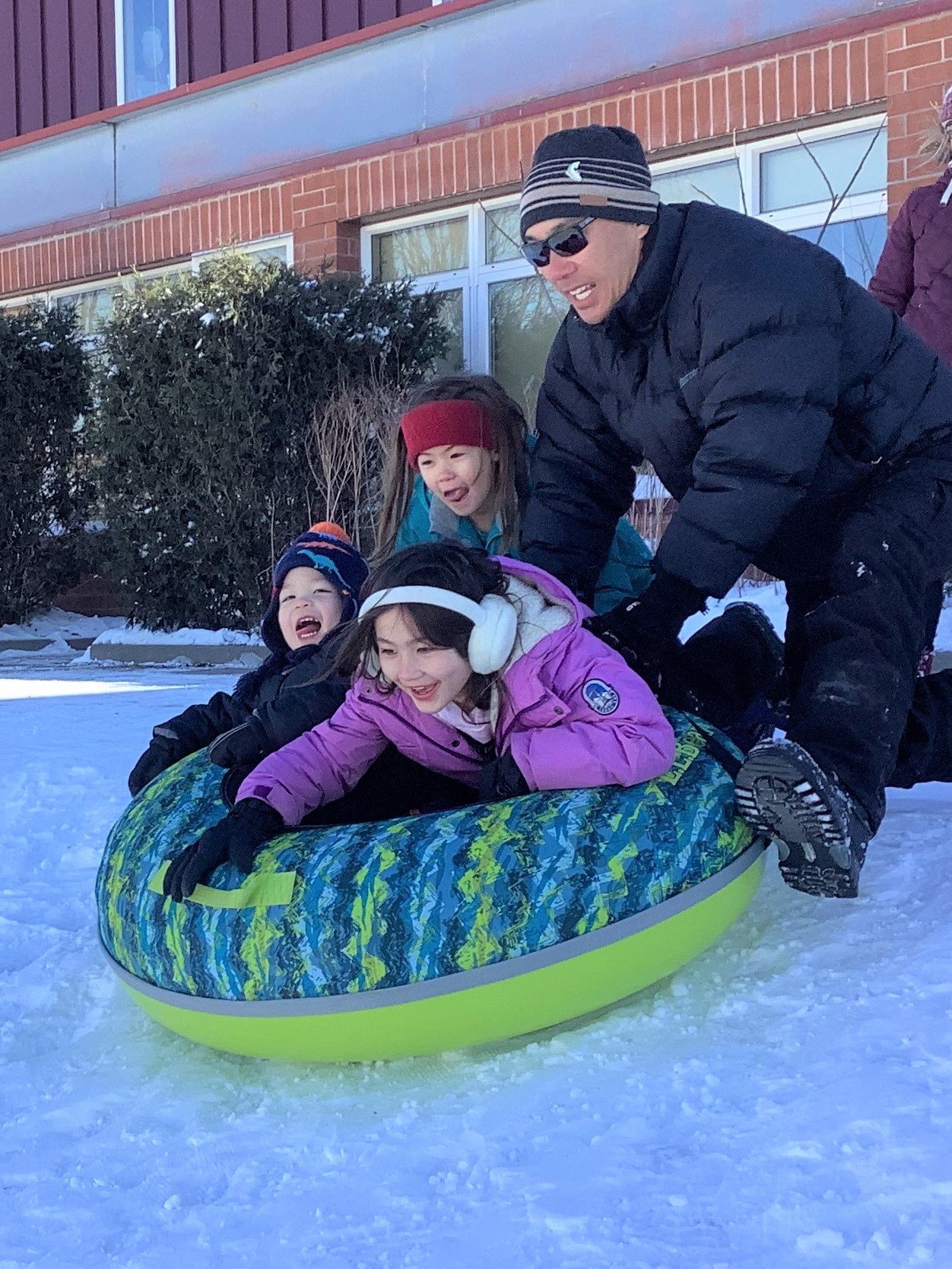
FAMILY BUZZ
Little People - Big Feelings
Today, in our Parent Connect gathering we talked about “Little People, Big Feelings”.
What are some ways that your child experiences “big feelings”?
How does that make you feel and how do you react?
At WWP we work on:
Naming emotions - in ourselves and noticing other’s emotions. Books are helpful with this.
Our bodies can give us clues about how we are feeling - facial expressions, stomach ache, clenched muscles
What can we do with our feelings? Some ideas: tell someone how we’re feeling, use our big muscles (jump, run, push the wall), cry, draw a picture/do art.
How can we calm down (regulate our emotions)? Deep breathing is a great tool, ask for a hug, have a snack, stuffed animal,
From Rachel Chrastil, licensed family educator and WWP parent.
Simple (but not easy!) steps for co-regulating/supporting self-regulation:
Stay Calm and Present: Model calm behavior by staying composed, using a soothing voice, and maintaining a gentle presence to help your toddler feel secure.
Validate Feelings with Simple Language: Acknowledge their emotions (e.g., "I see you're upset") to help them feel understood, and guide them in expressing their feelings.
Observe and Decide How to Respond: Are they calming down, or do they need more support? Based on that, decide how to move forward—whether it’s a calming reminder, offering comfort with a gentle touch, or redirecting their attention.
Co-regulation is not just about helping the child, but also about the parent being mindful of their own emotional state.
Turn everyday moments into learning opportunities!
We encourage you to REGISTER FOR THINK SMALL’S PARENT POWERED TEXTS!
Available toll free for families with children between ages 0-5
Weekly fun facts, easy tips, and ideas on how to promote your child’s learning
Evidence-based, whole child support
Messages are tailored specifically to your child’s age
Receive texts 3 times a week for 52 weeks
Research shows when parents participate in this program, their children are more prepared for kindergarten
Texts are available in English, Somali, and Spanish
Summer Fun Ideas!
Art - inside or outside, find things to create with… sticks, rocks, leaves, crayons, markers, scissors, glue, “junk” for sculptures (milk lids, styrofoam, popsicle sticks, etc.). Paint the sidewalk with water… what happens?
Bowling - Children ages 2 -15 years can sign up for free bowling! KidsBowlFree.com
Build - make a blanket fort, what can a cardboard box be?
Choo Choo Bob’s Train Toy Store & Interactive Play Space: Story time and live music, Union Depot 214 4th St. E Saint Paul, admission to play space $10 kids, $2 adults Check website for days and hours choochoobobstrainstore.com Great rainy day activity!
Dodge Nature Center - Free walking trails. 365 Marie Ave W West St Paul dodgenaturecenter.org
Garden - plant flowers, herbs, veggies. If you don’t have a yard, plant lettuce in a pot. Children are more excited to eat something they’ve helped to grow.
“I Spy” Neighborhood walks - Take walks often, each time looking for something different: numbers, letters, colors, animals, insects, traffic signs, etc.
Journal - keep a small notebook of things you do this summer. Children can draw pictures and dictate the words to be written down.
Library day - designate one day a week (or every other week) as “library day” Check out the website to see when storytime is at your local library www.hclib.com READ EVERYDAY!
Museums - Children's Museum (EBT cardholders $3), Mill City Museum (kids 4 & under free, EBT cardholders free), Minneapolis Institute of Art (free), Science Museum ($3 for those on assistance), Walker Art Center (kids free, EBT cardholders $2),
Parks - check out different parks/playgrounds in the area. Visit the wading pool or beach. Have a picnic lunch or dinner. Some parks have concerts, movies and classes. www.minneapolisparks.org www.ThreeRiversParks.org
Playdate - call a friend to meet at the park or come over to play. WWP will host a few playdates at Whittier Park this summer. Stay tuned for dates.
Relax - lay in the grass… What do you see, hear, feel? Take time to rest!
Sculpture Gardens - Free! www.walkerart.org See the spoon & cherry, blue rooster and so much more! If you’re up for a little road trip, check out Franconia Sculpture Garden 29836 St. Croix Trail Shafer, MN. franconia.org Create your own sculpture at home afterwards.
VBS - Come to Calvary’s “Eye Spy” Vacation Bible School, June 17-19, 5:30 - 7:30 PM, dinner included. 3 years and up. Free Contact amy@calvarychurchmpls.org for more info or to register. Ms. Ann will be there! Or check out your neighborhood church!
Woodlake Nature Center - Free! www.WooklakeNatureCenter.org
6710 Lakeshore Dr. Richfield Explore the great outdoors and visit the nature center. They have a great indoor area for rainy days.
Zoo - Como Zoo & Conservatory in St. Paul is free!
Additional Resources: familyfuntwincities.com
Fostering Resilience in Ourselves and Our Families
from Parent Connect - March 24, 2025
What is resilience?
Resilience is the ability to cope with, adapt to, and recover from stressful or challenging situations. It involves maintaining emotional and mental well-being in the face of adversity.
How can we help foster resilience in our children and ourselves?
Take good care of yourself and model it for your child.
Eating healthy
Exercise - move your body
Rest
Spiritual practice - praying, worship, meditating, mindfulness, etc
Artistic expression
Spend time in nature
Mental health - seek professional help as needed
Build a strong parent/child bond
Studies show that having at least one strong, stable adult relationship (parent, caregiver, teacher, etc.) is the single most important factor in a child being successful at overcoming hardship. https://developingchild.harvard.edu/resources/inbriefs/inbrief-the-science-of-resilience/
Show affection
Respond consistently to your child’s needs
Maintain a daily routine/ family rituals - regular mealtime routines, bedtime routines
Talk with your child about the challenges and difficult times you may be experiencing with simple, age appropriate language. Because saying “nothing is wrong” can be more stressful than acknowledging the tension.
Cultivate positive social/emotional skills and model them with your child.
Self awareness (What pushes my buttons? What gives me peace?)
Emotional regulation - Use calming techniques, like deep breathing.
Practice gratitude
Develop optimism and hope for the future.
Participate in things that bring you joy. Play together as a family!
Practice self compassion. Be gentle with yourself.
Lean into your social network. Build strong, healthy connections with others.
Family
Friends
Community - neighborhood, faith community, cultural community
Embrace growth and learning
View challenges as opportunities for personal development
Learn from setbacks and adapt your strategies as needed
Seek out new experiences and expand your comfort zone.
Establish a sense of purpose
What gives your life meaning?
Set goals for yourself
Volunteer in your community individually or as a family (clean up at the park, etc)
Resources:
https://www.naeyc.org/resources/blog/families-lay-your-burdens-down
https://www.inclusivechildcare.org/resource-library/document/building-resilience-young-children
ADVENTUROUS PLAY
Parent Connect 2/13/2025
The following information is from a class that the staff took in 2023 from Penn State’s Extension program: "Adventurous Play: The How's & Why's"
What is Adventurous Play?
Risk taking
Trying new things
Pushing the limits
Messy play/art
Sensory play
Heavy lifting/pushing
Spinning, hugging, squeezing, rocking, being upside down, balancing
Using dangerous tools
Being near dangerous elements (water, sticks, rocks, fire)
Heights
Speed
Rough & tumble / Wrestling/ “Big body play”
Playing alone
Touching what’s in a pumpkin is “adventurous play”.
What are the benefits of Adventurous Play?
Problem solving skills
Self confidence
Knowing one's limits - less likely to get hurt
Persistence
Being a good reader
Improved focus
Prepares one to learn how to drive
Physical strength
Having a growth mindset… the power of “yet”. “I can’t do it YET, but I will!”
Self control
Resilience
Social development - teamwork, relationships
Apprehensions/Worries/Barriers to Adventurous Play
Safety - getting hurt
Talk them through it. When a child embraces risk, our first instinct may be to remove them from the situation or warn them to “be careful.” A more meaningful response is to talk them through the risk. This way, we build children’s risk assessment and confidence. Before jumping in, take a moment to observe your child. What are they working on? What are the potential risks they face? Encourage them to think about or remember a goal for their activity (perhaps to reach the top of the play structure or the next branch). Then, invite them to tell you how their brain and their body feel as they work toward it. Siblings, same-aged peers, and friends are also good candidates for talking through risk with children.
Worry about dangerous tools - someone getting hurt
Rough & Tumble/Wrestling/Big Body Play - too rough
What are we doing at WWP to encourage Adventurous Play?
Playground - mud kitchen, downspout, sand play, climber/slides (climbing up slide), rocks, sticks, snow, ice
Gym - tumbling mats, trampoline, climber, hanging bar
Sensory table - water, sand, rice, etc.
We narrate what the kids are doing. Talking about how they’re using their bodies.
Tools - hammering
Messy art - finger paint, shaving cream, etc.
Science exploration & experiments: pumpkin carving, ice, etc.
Sensory play - playdough, glurch, sand, snow
Circle time: dancing, singing, musical instruments, yoga
Cooking projects: tasting new foods
Sledding
Field trips - going to new places, having new experiences
Ideas to try with your family:
Big Art - paint/color large cardboard box
Tools - hammering golf tees into styrofoam or cardboard
Letting them cut using a kid knife
Additional Resources:









